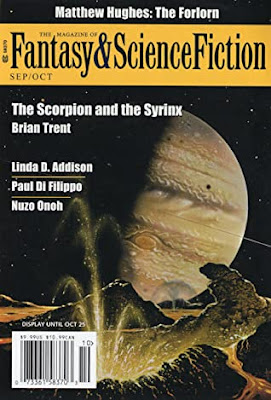*
The year 2021 (C.E. or A.D. according to taste) is almost over. It contained many good things including, most recently, Magister Nicolaus Copernicus, our new Christmas cat, so I will not complain about the pandemic. My New Year's resolution for 2022 is to return to writing the occasional short fiction review. Here, ahead of time, is the first fruit of that glad resolution:
“To the Honorable and Esteemed Monsters Under My Bed” by E. A. Bourland, The Magazine of Fantasy and Science Fiction, September/October, 2021.
For several reasons, this story ought not to work. The idea that the monsters under a child’s bed are real was done to death long ago. Its diction is decidedly twee and the boy’s voice is not that of an eight-year-old as it purports to be. The fate of the boy’s sister, who has disappeared, drives the plot but is never revealed. Moreover, at the end, the story, which was strongly grounded in a kind of reality, turns meta. Any one of these factors would be enough to sink pretty much any fiction. Plus, it is told in epistolary form, which is an open temptation to any writer to get lazy.
Yet work this story does. To begin with, it has considerable charm. Here’s how the first letter opens:
To: The honorable and esteemed monsters under my bed
From: Boy
Greetings, Ferocities
I dare the impertinence of addressing your toothy conventicle. I hear you down there, creaking, muttering, grinding your teeth, scrabbling your claws. Your horriblenesses, how you overwhelm me with dread! Indeed, so frightened am I, I dare not lie back in restful repose, but rather can only sit upright in this bed, one arm extended from the redoubt of my blanket to compose by moonlight this letter, which I hope you might spare from your diabolical schedule a moment to consider.
Bourland clearly loves words, not indiscriminately but well. The whimsy of the elocution is nicely balanced by the physicality of the sounds of “creaking, muttering, grinding […], scrabbling.” Language like this can accomplish a lot. Immediately, it establishes the character of the boy—his self-assurance, his intelligence, and his lack of fear above all.
Under-the-bed monsters are notoriously less clever than they think themselves. So they write back:
To: Tasty Little Boy
From: Monsters
Dear Little Boy,
Well, now. Good evening. Heh heh heh! We have received your missive and discussed your request but must respond in the negative. As monsters, our dedicated mission is to instill nocturnal dread in children. […] Kindly dangle your eight-year-old toes off the end of the bed to allow us toe-tasties.
Back and forth the correspondence goes, with the boy protected by a nightlight and two stuffed animals, one of which has been captured by the monsters. The monsters try to trick the boy into their clutches and he, of course, consistently outwits them. In the course of these exchanges, the reader learns that the boy’s absent father is a space-hero, off on a prolonged mission to save humanity. Also that the boy is pushed around by bullies at school, that his teacher is a petty tyrant, and that the man who has taken the father’s place in the mother’s affections is a “banging-threatening-looming” sort who may be responsible for the sister’s disappearance.
Briefly, it is possible to read this story as a war between imagination and reality, with reality having all the power. Happily, this is not the direction the plot takes. Instead, the boy escapes bullies, teachers, and his B-T-L father substitute. Not, however—and this is essential—through trickery but by honoring a difficult pact he has made with the honorable and esteemed creatures under his bed. Because he has made a promise and honored it with a sacrifice, the ending, in which he becomes a genuine hero, feels earned rather than declared by auctorial fiat.
It all, mirabile dictu, works perfectly.
*

No comments:
Post a Comment